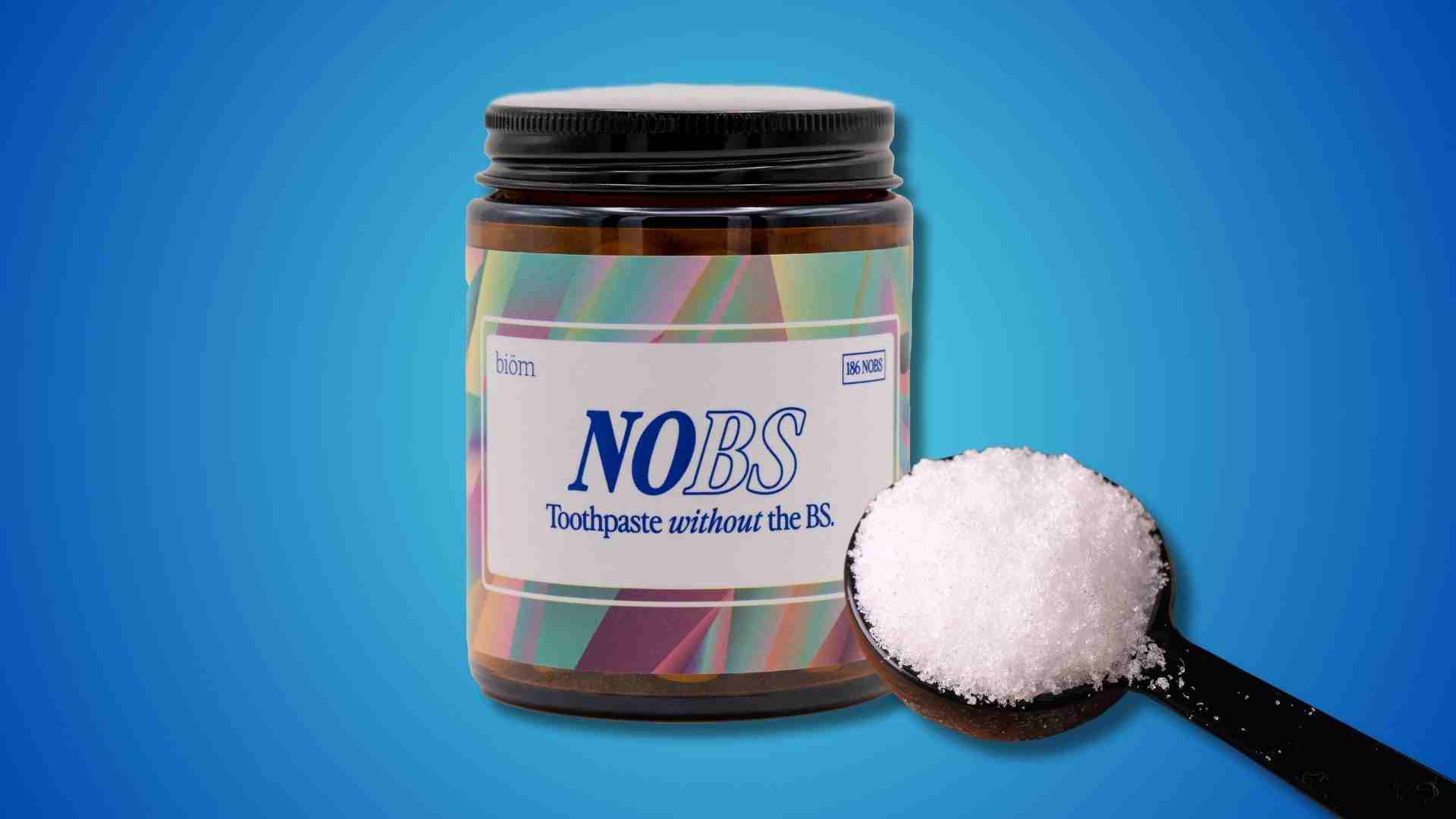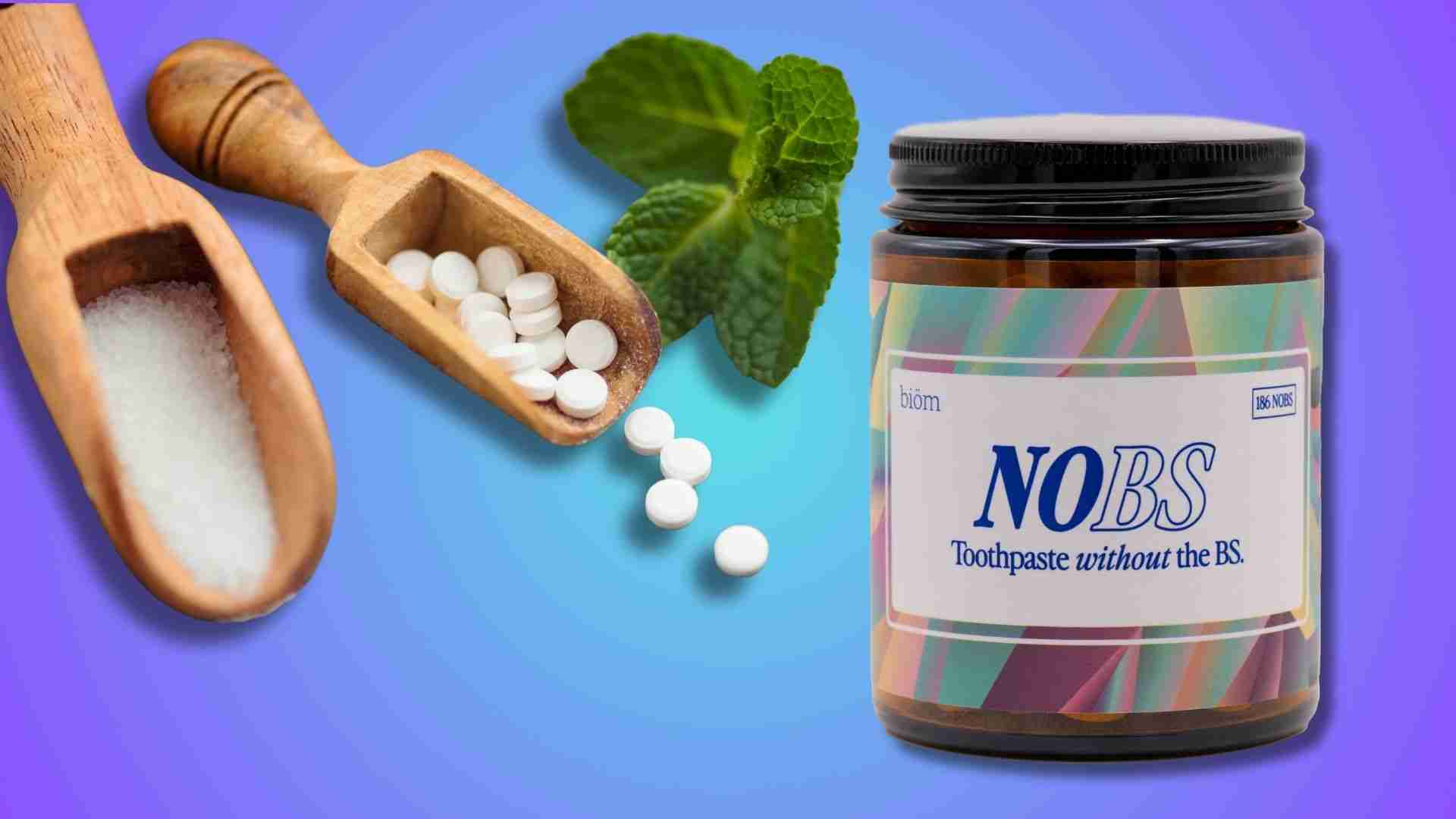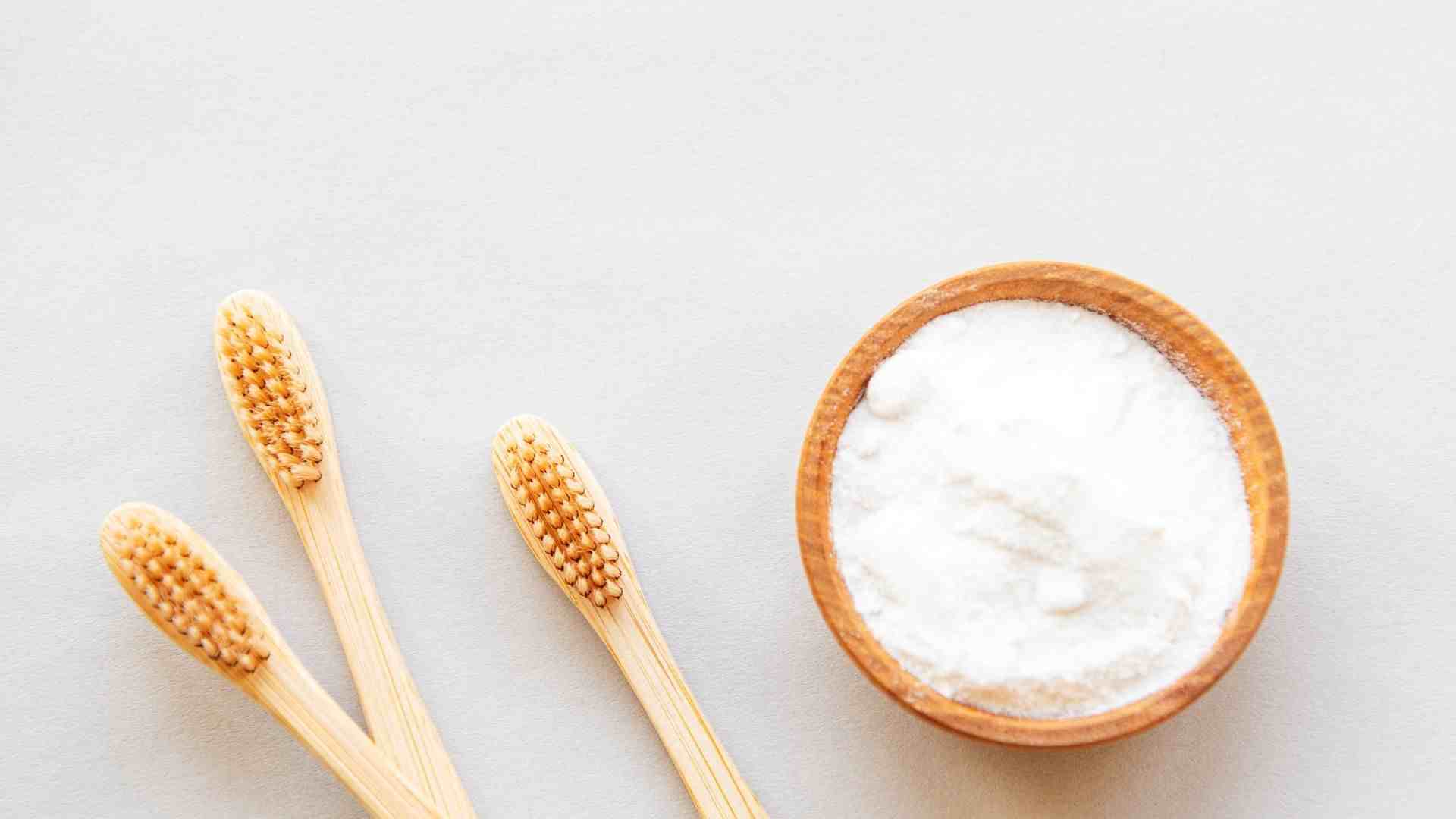Does Xylitol Remineralize Teeth?
Yes, xylitol does remineralize teeth. In addition to preliminary evidence that xylitol remineralizes teeth on its own, xylitol also indirectly enhances the remineralization process by creating an alkaline environment in the mouth that is conducive to remineralization.
It does so by reducing the levels of decay-causing bacteria and not providing the fermentable sugar those bacteria need to produce harmful acids. This reduction in acid supports healthy pH balance which we need for minerals like calcium and phosphate to be deposited into tooth enamel.

Further, xylitol in toothpaste stimulates saliva production, which is a natural defense mechanism against tooth decay. Saliva not only helps to wash away food particles and bacteria but also brings more remineralizing minerals in contact with the enamel.
This process supports the repair of early enamel lesions and prevents the progression of tooth decay. That said, xylitol cannot reverse cavities.
Finally, studies also show that xylitol can enhance the remineralization effect of remineralizing toothpaste, such as fluoride toothpaste.
In this article, I'll explain everything you need to know about xylitol for teeth remineralization.
So, what is xylitol toothpaste?

Xylitol toothpaste is a type of dental care product that incorporates xylitol as a key ingredient. Why xylitol?
Well, xylitol is a safe, natural sugar alcohol known for its sweetening properties and oral health benefits. Unlike traditional sugars, xylitol doesn't contribute to cavities. Instead, it actively combats the growth of cavity-causing bacteria in our mouths, particularly Streptococcus mutans.
This is the bacteria is responsible for producing the acidic by-products that lead to tooth decay. Xylitol works by inhibiting these bacteria, thereby reducing plaque formation and lowering your risk of dental cavities.
In addition to its antibacterial properties, xylitol also enhances saliva production, which is important for maintaining oral health. Increased saliva flow helps neutralize acids in our mouths, wash away food debris, and facilitates enamel remineralization, which can further protect against demineralization decay.
In addition to toothpaste, you can also find xylitol chewing gum and breath mints which can fight tooth decay.
What is remineralization?

Remineralization is a natural tooth repair process that occurs daily inside the mouth.
It works to repair lost enamel through the deposition of calcium and phosphate minerals from saliva into the enamel, helping to keep teeth strong and prevent tooth decay.
This process is essential for maintaining the integrity of the teeth and is a continuous, natural repair mechanism to restore minerals to the tooth enamel.
Remineralization can be promoted through various methods, including the use of remineralizing toothpaste with xylitol and nano hydroxyapatite, maintaining a balanced diet, and practicing good oral hygiene habits such as regular brushing and flossing.
How does xylitol help teeth?
Xylitol helps protect teeth by reducing harmful bacteria, especially Streptococcus mutans, which causes cavities.
It works by interfering with the bacteria’s ability to produce acids, preventing enamel damage. Additionally, xylitol promotes saliva production, which helps balance pH levels in the mouth and supports natural remineralization.
When combined with nano-hydroxyapatite, it creates a powerful duo that strengthens enamel while preventing bacteria from sticking to teeth.
This combination not only protects against cavities but also helps repair minor enamel damage. Its sweet taste makes xylitol a popular and effective ingredient in toothpaste and chewing gum. Together, they offer a safe and natural way to maintain strong and healthy teeth.
Remineralization effects of xylitol on demineralized enamel
Xylitol has been shown to promote the remineralization of demineralized enamel, aiding in the restoration of tooth structure.
A study indicated that xylitol can enhance the uptake of minerals like calcium and phosphate into the enamel, which are critical for strengthening and repairing tooth surfaces.
By reducing the levels of harmful bacteria in the mouth, xylitol helps create an environment conducive to enamel remineralization.
Additionally, regular use of xylitol products can significantly improve overall dental health and reduce the risk of cavities.
Can xylitol reverse cavities?

No, while xylitol toothpaste is good for your teeth, it does not reverse cavities. This is because you cannot remineralize a cavity once it has already formed.
That said, xylitol toothpaste can help in the early stages of cavity formation by promoting remineralization, a process where minerals are redeposited in demineralized tooth enamel. Xylitol increases saliva production, which is rich in minerals like calcium and phosphate that can strengthen tooth enamel and potentially reverse early enamel erosion.
This process can prevent smaller cavities from progressing past the initial stages of tooth decay. However, xylitol toothpaste cannot reverse cavities that have progressed beyond the initial stage of enamel demineralization to form a physical cavity.
Once a cavity has fully formed, you'll have to see a dentist for professional treatment to remove the decay and restore the tooth.
So, while xylitol toothpaste is great for supporting your overall oral health and reversing the early stages of tooth decay, it's not a substitute for professional treatment of established cavities.
Benefits of Xylitol Toothpaste

Xylitol toothpaste tablets offer many benefits for our oral health, making it a standout ingredient in toothpaste and other dental care products. Let's walk through 5 of the most important benefits together.
Prevents Cavities
One of the most celebrated benefits of xylitol is its ability to prevent cavities.
Xylitol works by inhibiting the growth of Streptococcus mutans, a cariogenic bacteria primarily responsible for tooth decay. Unlike regular sugars that feed harmful oral bacteria, xylitol can't be metabolized by these bacteria, thereby reducing their growth and the acids they produce that wear away at enamel.
Research suggests that regularly using xylitol toothpaste can significantly lower your risk of developing dental cavities, offering a proactive approach to oral health.
Reduces Plaque
Plaque buildup is a major contributing factor to dental health issues, including cavities and gum disease. Thankfully, xylitol is known for its ability to reduce the amount of plaque-forming bacteria in our mouths.
Since xylitol doesn't serve as a food source for these bacteria, their ability to stick to teeth and form plaque is diminished. This process helps keep your teeth cleaner and healthier, reducing the likelihood of oral health problems down the line.
While xylitol does not directly whiten teeth, it may help improve the appearance of your smile by preventing plaque buildup that may otherwise cause discoloration.
Enhances Saliva Production
Saliva is a natural defense mechanism against tooth decay, and xylitol helps enhance its production. By stimulating saliva flow, xylitol helps neutralize acids in the mouth, washing away food particles, and keeping the mouth moist.
This increased saliva production is particularly beneficial for those of us suffering from dry mouth, a condition that can increase the risk of tooth decay and gum disease.
Remineralizes Teeth
Remineralizing teeth is one of the most important benefits of xylitol. Your saliva, stimulated by xylitol is rich in important minerals like calcium and phosphate which your body uses to remineralize, repair, and strengthen your enamel.
This process not only reverses tooth decay but also fortifies your teeth against future erosion.
Tastes Great
Beyond its health benefits, xylitol is naturally sweet and adding it to toothpaste makes it more enjoyable to brush with, especially for children and those who are sensitive to the taste of traditional toothpaste.
This pleasant taste encourages regular brushing and contributes to better oral hygiene without the negative effects of sugar.
Xylitol vs Hydroxyapatite
Xylitol and hydroxyapatite are both popular ingredients in oral care, but they serve different purposes.
Xylitol is a natural sugar alcohol that helps reduce cavity-causing bacteria by neutralizing acids and preventing plaque formation. On the other hand, hydroxyapatite is a mineral that closely resembles the natural structure of tooth enamel, helping to repair and strengthen teeth by filling microscopic cracks.
While xylitol focuses on reducing harmful bacteria, hydroxyapatite restores and fortifies tooth structure. Both ingredients share a commitment to improving oral health, but they work in complementary ways.
When combined, as seen in NOBS Toothpaste Tablets, they provide a dual-action approach: xylitol protects against decay while hydroxyapatite promotes enamel repair, offering comprehensive dental care.
Do xylitol and nano hydroxyapatite work well together in toothpaste?

Yes, nano hydroxyapatite and xylitol work well together in toothpaste thanks to their combined unique benefits.
Xylitol, as we discussed earlier, inhibits the growth of decay-causing bacteria and promotes remineralization. It also increases saliva production and supports oral pH balance, providing a natural defense against cavities.
Nano hydroxyapatite, on the other hand, is a biomimetic material that closely resembles the natural mineral composition of tooth enamel. It has been shown to directly contribute to the remineralization process by bonding with and rebuilding the hydroxyapatite crystals in tooth enamel.
When combined in toothpaste, xylitol, and nano-hydroxyapatite offer a comprehensive approach to oral care: xylitol targets the bacterial aspect and the conditions for remineralization, while nano-hydroxyapatite provides the minerals necessary for actual enamel repair.
That's why our toothpaste tablets are jam-packed with xylitol and nano hydroxyapatite!
How can I speed up my tooth remineralization?
To speed up tooth remineralization, using remineralizing toothpaste containing nano-hydroxyapatite (nHAp) can be highly effective.
Studies suggest that nano-hydroxyapatite, a material similar to the natural mineral in tooth enamel, helps repair microscopic damage by filling in small cracks and restoring mineral content.
nHAp enhances enamel strength and promotes remineralization more effectively than fluoride alone. This toothpaste can also help reduce tooth sensitivity by repairing areas of enamel erosion.
Additionally, brushing with nHAp toothpaste regularly helps neutralize acids that can cause enamel demineralization.
Studies also show that nHAp toothpaste is safe for long-term use and helps prevent cavities by providing a protective barrier on the teeth.
Using this toothpaste alongside a healthy diet rich in calcium and phosphate, and avoiding acidic foods, can significantly speed up the remineralization process.
Frequently Asked Questions
Does xylitol rebuild enamel?
While xylitol doesn't directly rebuild enamel, it can contribute to enamel remineralization by promoting saliva production, which contains essential minerals like calcium and phosphate. These minerals help strengthen and repair enamel over time. Additionally, xylitol's ability to inhibit harmful bacteria growth reduces the risk of enamel erosion and cavity formation, indirectly supporting enamel health. Incorporating xylitol into your oral care routine, along with regular brushing and dental check-ups, can help maintain and protect enamel integrity.
Can xylitol reverse periodontal disease?
Xylitol can't reverse periodontal disease on its own, but its antibacterial properties may aid in managing the condition. By reducing the growth of harmful bacteria in the mouth, xylitol may help control inflammation and prevent further progression of periodontal disease when used as part of a comprehensive oral care regimen. However, it's essential to consult with a dentist for proper diagnosis and treatment of periodontal disease, as xylitol alone may not be sufficient for reversing its effects.
Does xylitol dissolve plaque?
Xylitol does not dissolve plaque directly, but it helps reduce plaque buildup over time. Its mechanism is based on inhibiting the growth of Streptococcus mutans, a primary bacteria responsible for plaque formation. Since these bacteria cannot metabolize xylitol for energy, their growth is limited, leading to less plaque accumulation on teeth. Regular use of xylitol-containing products can thus contribute to a decrease in plaque levels and promote oral health, but it should be part of a broader oral hygiene routine that includes brushing and flossing.
How can I remineralize my teeth fast?
To support the health of your teeth and promote remineralization, it's crucial to brush regularly and reduce your intake of sugary and acidic foods. Regular brushing, at least twice a day of nano hydroxyapatite with xylitol toothpaste, helps remove plaque and prevents the demineralization of tooth enamel. Sugary and acidic foods and drinks can erode tooth enamel over time, making teeth more susceptible to decay. By cutting down on these foods and beverages, you'll significantly lower the risk of cavities and enhance your oral health. Remember, maintaining a balanced diet and practicing good oral hygiene are key steps toward keeping your teeth strong and healthy.
What mineral rebuilds teeth overnight?
The minerals calcium and phosphate which you can get from hydroxyapatite play a crucial role in rebuilding teeth overnight. Hydroxyapatite is a naturally occurring form of calcium phosphate that is the primary component of tooth enamel. These minerals help repair and remineralize teeth while you sleep, reinforcing the enamel and making it more resistant to decay. Using toothpaste or oral care products containing hydroxyapatite can enhance the remineralization process, promoting the restoration of tooth enamel and improving overall dental health.
How can I remineralize my teeth naturally?
To naturally remineralize your teeth, it's crucial to adjust your diet and oral hygiene practices. Reducing your intake of sugary foods and acidic beverages can significantly help in this regard, as these substances can demineralize your teeth, leading to decay. Incorporating a toothpaste that contains nano hydroxyapatite and xylitol is a smart choice for remineralization. Nano hydroxyapatite is known for its ability to mimic the natural building blocks of your teeth, helping to repair enamel, while xylitol helps to reduce harmful bacteria in your mouth. Together, they provide a potent combination for strengthening your teeth from the inside out.
Does xylitol gum reverse tooth decay?
Xylitol gum does not directly reverse tooth decay but can significantly aid in its prevention and support overall oral health. Chewing xylitol gum stimulates saliva production, which helps neutralize acids and promotes the remineralization of tooth enamel. When used in conjunction with xylitol toothpaste, which provides a more concentrated dose of xylitol and additional oral health benefits, the effectiveness of preventing and managing tooth decay is enhanced. Together, xylitol gum and toothpaste can create a more protective environment for teeth, reducing the risk of cavities.
How long does it take for xylitol to work on teeth?
The effects of xylitol on teeth can vary based on individual usage and dental health, but improvements can often be observed within a few weeks of regular use. Studies indicate that consistent use of xylitol, particularly in gum or toothpaste, may lead to a reduction in cavity-causing bacteria and an increase in saliva flow, promoting remineralization of enamel. However, significant changes, such as a reduction in cavities, may take several months to become evident. For best results, xylitol should be used consistently alongside good oral hygiene practices.
Does xylitol help remineralize teeth?
Yes, xylitol can help remineralize teeth by promoting the absorption of calcium and phosphate, which are essential for enamel repair. Xylitol reduces the growth of cavity-causing bacteria, creating a healthier environment for remineralization. It can also increase saliva flow, which naturally aids in remineralizing the teeth
Can I use xylitol everyday?
Yes, you can use xylitol every day, as it is safe for most people and has dental benefits. Regular use of xylitol, such as in gum or toothpaste, helps reduce cavity-causing bacteria and supports enamel remineralization. However, consuming it in large amounts may cause digestive discomfort, so it's best to use it in moderation.
Does xylitol really help your teeth?
Yes, xylitol helps protect your teeth by reducing harmful bacteria like Streptococcus mutans that cause cavities. It also balances pH levels in your mouth and promotes saliva production, which supports natural enamel repair. Regular use of xylitol in products like toothpaste or gum can lower cavity risk and improve overall oral health.
Can you reverse cavities with xylitol?
Xylitol cannot fully reverse cavities but can help stop their progression by reducing harmful bacteria and promoting a healthier oral environment. It balances pH levels, supports saliva production, and aids in the remineralization of early-stage enamel damage. For reversing small cavities, xylitol works best when combined with remineralizing agents like fluoride or nano-hydroxyapatite.
How do your teeth remineralize?
Your teeth remineralize through a natural process where minerals like calcium and phosphate are redeposited into your enamel. This happens when your saliva neutralizes acids in your mouth, creating a balanced pH that supports mineral absorption. Using products with fluoride or nano-hydroxyapatite can enhance this process by strengthening enamel and repairing early damage.
Which is better, xylitol or hydroxyapatite?
Both xylitol and hydroxyapatite are beneficial, but they serve different purposes in oral care. Xylitol helps reduce cavity-causing bacteria, while hydroxyapatite repairs and strengthens tooth enamel. Together, they offer a comprehensive solution for protecting and restoring our teeth,






















